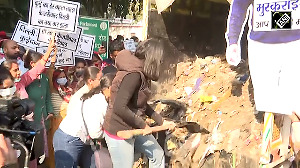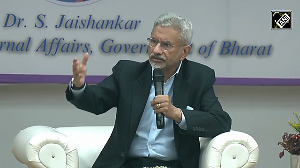Jihadis toting automatic weapons patrolled a mosque in Pakistan last week as the cleric who heads the militant network blamed for the 26/11 Mumbai attacks preached inside.
The group's supporters collected funds in the courtyard and later marched through Lahore, calling for the death of those who insult Islam.
Pakistan announced a ban on Jamaat-ud-Dawa -- sealing the group's offices, freezing assets and rounding up leaders -- amid international outrage after the 2008 siege of the Indian financial capital.
But the group has scored a few wins in court against the government and is up and running again, exposing Islamabad's unwillingness to fully crack down on militants who target India.
The resurgence of the group could chill the first round of peace talks between Pakistan and India since the attacks. India is insisting the negotiations on Thursday to focus on Pakistan's efforts to rein in groups such as Jamaat-ud-Dawa; Pakistan wants all issues, including Kashmir, to be on the table.
The United States has urged the two nuclear-armed nations to resume dialogue despite Indian concerns about the Pakistan's crackdown on militants.
Both nations mobilised troops to their shared border as tensions spiked following Mumbai. Another major attack by Pakistani militants on Indian soil would put New Delhi under intense domestic pressure to mount a military response.
India, the US and the United Nations allege Jamaat is the front group for Lashkar-e-Tayiba, which they charge carried out the attacks in November 2008 that killed 166 people in Mumbai.
Seven militants identified as members of Lashkar by prosecutors are currently on trial in Pakistan charged with planning and carrying out the attacks.
The sole surviving alleged gunman in the attacks, Ajmal Kasab, a Pakistani with links to Lashkar, is on trial in India. Lashkar was founded in the 1980s by Hafiz Saeed with the assistance of Pakistan's security agencies to wage war against India in the hopes of wresting the Indian portion of Kashmir away from New Delhi.
The group claimed responsibility for numerous attacks there, but the government banned it in 2002 following pressure from the US after the 9/11 attacks. Saeed is now the leader of Jamaat, which claims to be focussed only on charity work.
It runs a large network of Islamic schools and clinics, and participates in disaster relief. Members of Jamaat say there is no link between it and Lashkar.
But even Rana Sanaullah Khan, who is the law minister in Punjab, said the two are simply different wings of the same group.
After the Mumbai siege, Saeed, a 60-year-old former Islamic studies lecturer, was placed under house arrest but was freed in June last year by the Lahore high csourt, which said there was no evidence he was involved in any wrongdoing.
In October, a court ruled there was no case against Saeed and found that the government had never formally prohibited Jamaat. The government has appealed to the Supreme Court. Even before the court ruling, however, critics said Pakistan was not aggressively enforcing the ban.
Saeed has exploited the legal limbo and openly challenges the government's attempts to tamp down his group. On the government's Kashmir Solidarity Day earlier this month, Saeed addressed supporters in Lahore who waved Lashkar flags and shouted 'Here comes Lashkar to kill the Hindus.'
"If America with the help of NATO and all its weapons could not maintain its occupation in Afghanistan, India too will not be able to hold on to Kashmir anymore," Saeed told the crowd.
Frustration at the impunity groups like Jamaat seem to enjoy angers some lawmakers. "It is shocking to see how banned terrorist organisations are allowed to challenge the writ of the state," Sherry Rehman, a lawmaker with the ruling party, told parliament on Tuesday.
"What is the point of our innocent civilians and soldiers dying in a borderless war against such terrorists, when armed, banned outfits can hold the whole nation hostage in the heart of Punjab's provincial capital?"
Security and government officials in Lahore offered several reasons for the lack of action against Saeed and his group. They said India had presented no evidence of his involvement in the Mumbai attacks; stressed he was not involved in any of the attacks by militants that have struck Pakistan over the last year, several of them in Lahore; and they said that closing the group's schools would deprive thousands of an education and health care.
India has demanded Saeed be put on trial for the Mumbai attacks.






 © 2025
© 2025